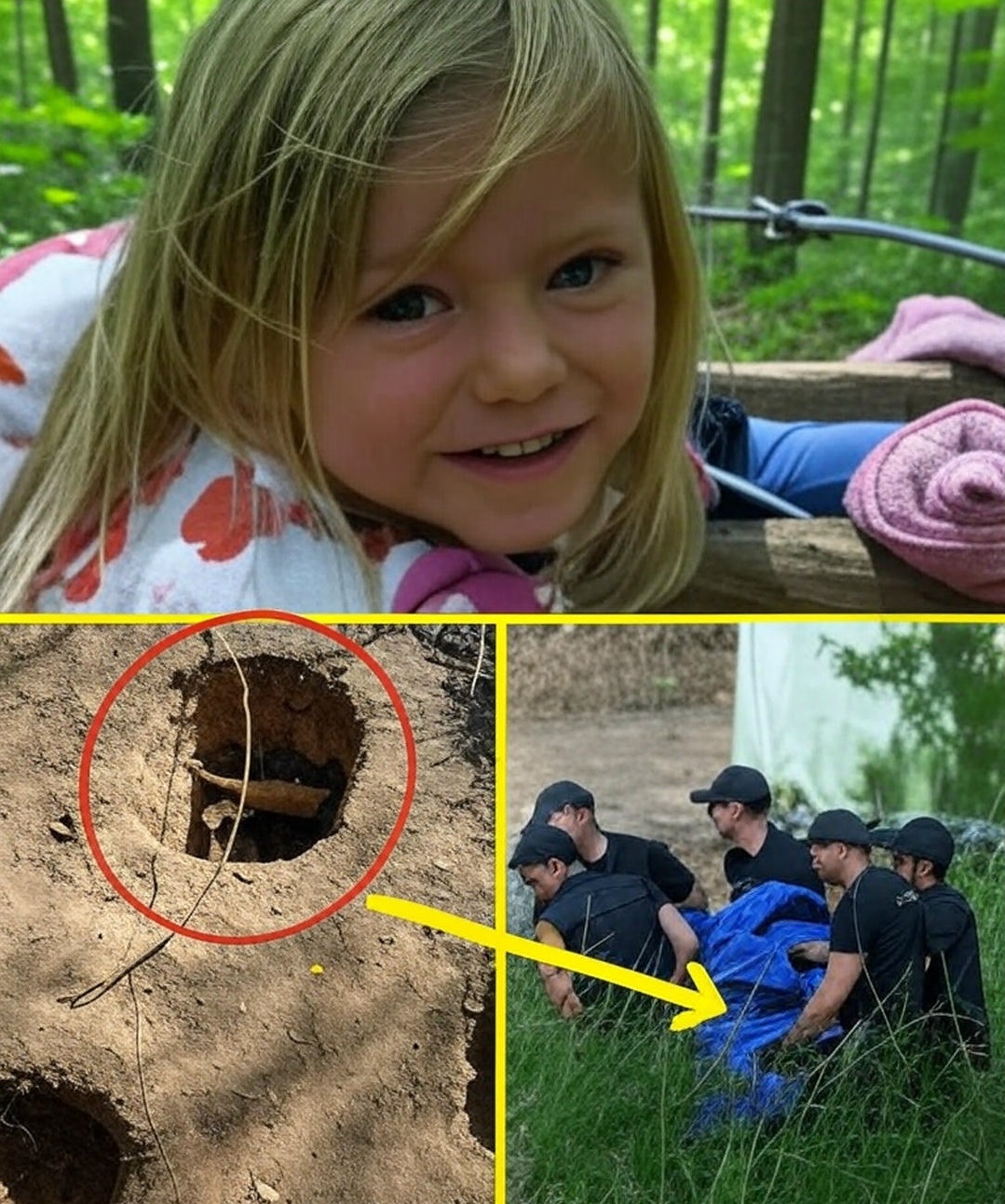‘They’ve Finally Found Something!’ – Detective’s Bold Claim of ‘Key Evidence’ in Madeleine McCann Case Ignites Hope for Answers!
Unravel the mystery behind this shocking breakthrough and discover what it means for Madeleine’s family!

A Breakthrough in the Madeleine McCann Case? Detective Claims ‘Key Evidence’ Found
Eighteen years after Madeleine McCann vanished from a holiday apartment in Praia da Luz, Portugal, a flicker of hope has emerged in one of the world’s most enduring mysteries. In June 2025, Danie Krugel, a South African private detective who once worked with the McCann family, made a bold claim: German police have uncovered “key evidence” during a search near the Ocean Club resort where Madeleine, then three, disappeared on May 3, 2007. Krugel’s assertion, tied to a meticulous operation in specific ruins, has reignited public interest and speculation. While German and Portuguese authorities remain tight-lipped, the claim fuels hope that the truth about Madeleine’s fate may finally surface, even as skepticism lingers about the evidence’s significance.
The Night That Changed Everything
Madeleine McCann’s disappearance is etched into global consciousness as a heart-wrenching enigma. On that fateful evening, Kate and Gerry McCann, British doctors from Rothley, Leicestershire, were dining with friends 55 meters from their ground-floor apartment at the Ocean Club. Madeleine and her two-year-old twin siblings were asleep inside, with the parents checking on them regularly. At 10:00 PM, Kate discovered Madeleine’s bed empty, the window open, and the shutter raised. The alarm was raised, sparking a massive search that drew unprecedented media attention. Described by The Daily Telegraph as “the most heavily reported missing-person case in modern history,” Madeleine’s story became a global obsession, her bright-eyed image a symbol of loss and hope.
The initial investigation by Portugal’s Polícia Judiciária (PJ) faced criticism for its handling, with early focus on the McCanns themselves. In September 2007, Kate and Gerry were named “arguidos” (suspects) after traces of Madeleine’s blood were reportedly found in a car they rented 25 days later. The couple maintained their innocence, and the arguido status was lifted in July 2008 when the case was archived for lack of evidence. The McCanns, undeterred, funded private investigations, hiring firms like Oakley International to pursue leads. In 2011, the UK’s Metropolitan Police launched Operation Grange, treating the case as a “criminal act by a stranger,” likely an abduction. Despite millions spent and countless leads, Madeleine’s whereabouts remain unknown, though German prosecutors now assume she is dead.
Danie Krugel’s Role and Controversial Claim
Danie Krugel entered the McCann case in June 2007, invited by Gerry McCann to assist with his “matter orientation system,” a handheld device Krugel claimed could locate missing people using DNA and satellites. The McCanns, desperate for answers, sent him Madeleine’s hair and eyelashes from their UK home. Krugel arrived in Praia da Luz on July 15, 2007, and claimed his device detected a “static signal” near the Rocha Negra cliff. The PJ’s lead inspector, Gonçalo Amaral, dismissed this as a distraction, and scientists later scoffed at Krugel’s technology, with one calling it “BS.” Kate McCann, in her 2011 book, admitted Krugel’s claims made little sense but reflected their desperation.
Fast forward to June 2025, and Krugel is back in the spotlight. Following a German-led search from June 2–6 in Praia da Luz, Krugel told The Olive Press he’s convinced authorities found “important key evidence.” The search, conducted with 30 German specialists across three or four ruins near the Ocean Club, reportedly uncovered clothing and animal bones. Krugel pointed to the investigators’ body language and the operation’s abrupt end as signs of a breakthrough. He noted that the search aligned with the area he identified in 2007, reinforcing his belief in its significance. However, no official confirmation has emerged, and sources indicate that “numerous bags of material” were sent to Germany for analysis, with results expected to take weeks.
Christian Brückner: The Prime Suspect
The renewed search is tied to Christian Brückner, a 48-year-old German convicted rapist and pedophile named the prime suspect in 2020. Brückner lived in the Algarve between 1995 and 2007, occasionally working as a handyman at the Ocean Club. German prosecutors linked him to the case through phone records placing him near Praia da Luz on May 3, 2007, and a car he re-registered the next day. In 2016, while investigating another missing child, police found disturbing items at Brückner’s properties, including a hard drive, memory sticks, children’s clothing, 75 swimsuits, and child sexual abuse material, some hidden under a dead dog. A 2022 documentary, Madeleine McCann: The Unseen Evidence, suggested the hard drive might contain proof of Madeleine’s death, though German police dismissed this as speculative.
Brückner, currently serving a seven-year sentence for raping a 72-year-old American woman in Praia da Luz in 2005, has denied involvement in Madeleine’s case. In a letter published by The Sun, he taunted police, writing, “Is there a body? No, no, no,” and claimed no DNA or vehicle evidence links him to the crime. A former cellmate, Laurentiu Codin, testified in 2020 that Brückner boasted about abducting a child from a Portuguese apartment via an open window, a story mirroring Madeleine’s case. Another witness, Helge B., claimed Brückner said Madeleine “didn’t scream,” though his credibility is questioned. Despite these claims, German prosecutor Hans Christian Wolters admitted in 2020 that evidence is insufficient to charge Brückner, a stance unchanged as of June 2025.
The June 2025 Search: A Turning Point?
The June 2025 search, authorized by German prosecutors and supported by Portuguese police, targeted 21 plots of land between the Ocean Club and Brückner’s former residence. The operation, described as highly targeted, involved closing roads and deploying specialists. Local media reported finds of clothing and animal bones, but German police chief Rainer Grimm expressed skepticism, reportedly telling a friend, “Thanks, we need luck.” Former British detective Mark Williams-Thomas, who has followed the case, criticized the search as based on “sketchy” information, suggesting more focus on Brückner’s German properties. Yet, Krugel’s optimism contrasts with this caution, fueling hope among Madeleine’s supporters.
The McCanns, now in their late 50s, have never wavered in their search. In May 2025, marking 18 years since Madeleine’s disappearance, they wrote on their Find Madeleine website, “Our determination to leave no stone unturned is unwavering.” They welcomed the 2022 naming of Brückner as an arguido, seeing it as progress. Kate and Gerry, who still buy birthday and Christmas gifts for Madeleine, hold onto hope, though German authorities’ murder inquiry tempers their optimism. The UK’s Operation Grange, now down to a small team, continues to treat the case as a missing persons investigation, lacking definitive proof of Madeleine’s fate.
Skepticism and Hope in Equal Measure
Krugel’s claim is not without critics. His 2007 “matter orientation system” was widely debunked, and his reliance on investigators’ “body language” lacks concrete backing. The search’s findings—clothing and bones—may be unrelated, as Praia da Luz is a tourist area with years of accumulated debris. German police’s silence, coupled with their history of caution, suggests the evidence may not be the breakthrough Krugel claims. Brückner’s acquittal in October 2024 on unrelated sexual offense charges, despite his criminal history, underscores the challenge of securing convictions without solid proof. The absence of Madeleine’s body or direct DNA evidence remains a hurdle, as Brückner himself noted in his taunting letter.
Yet, the McCann case has defied closure for nearly two decades, sustained by moments like this. The 2013 e-fit images from Operation Grange, the 2020 focus on Brückner, and now the 2025 search keep the case alive. The McCanns’ spokesman, Clarence Mitchell, once called Brückner’s naming “potentially very significant,” a sentiment echoed by Kate and Gerry’s gratitude for ongoing efforts. The Praia da Luz community, weary of media scrutiny, hopes for resolution, as do millions worldwide who followed Madeleine’s story.
A Family’s Unending Quest
Kate and Gerry McCann have endured unimaginable scrutiny, from early suspicions to media frenzy. Their resilience—launching petitions, writing books, and funding searches—reflects a refusal to give up. The June 2025 search, whether it yields answers or not, is another step in their quest for truth. Krugel’s claim, while unverified, offers a glimmer of possibility, a reminder that even cold cases can yield surprises. As the world awaits results from the German analysis, Madeleine’s absence continues to ache, her parents’ words a poignant plea: “We need to know to find peace.”
The Madeleine McCann case remains a puzzle with missing pieces, but Krugel’s assertion and the latest search suggest those pieces may be closer than ever. Whether this “key evidence” unlocks the truth or joins the case’s many false leads, it keeps Madeleine’s name alive, urging answers in a story that refuses to fade.





